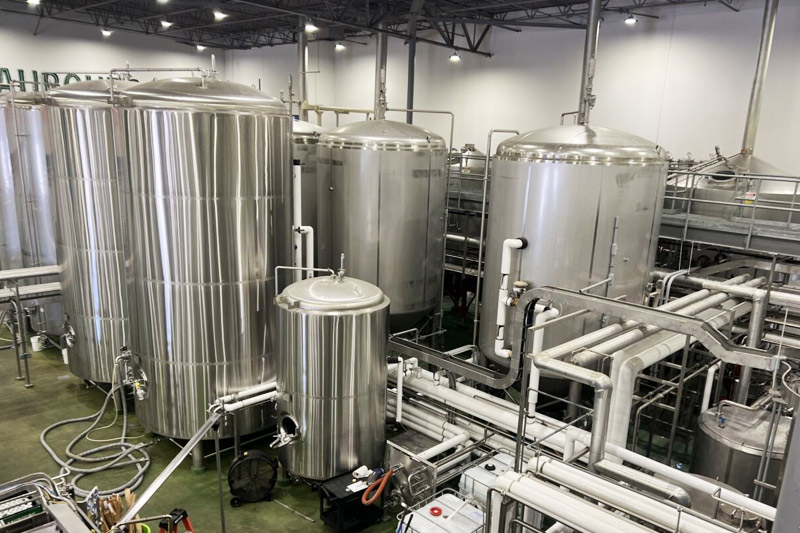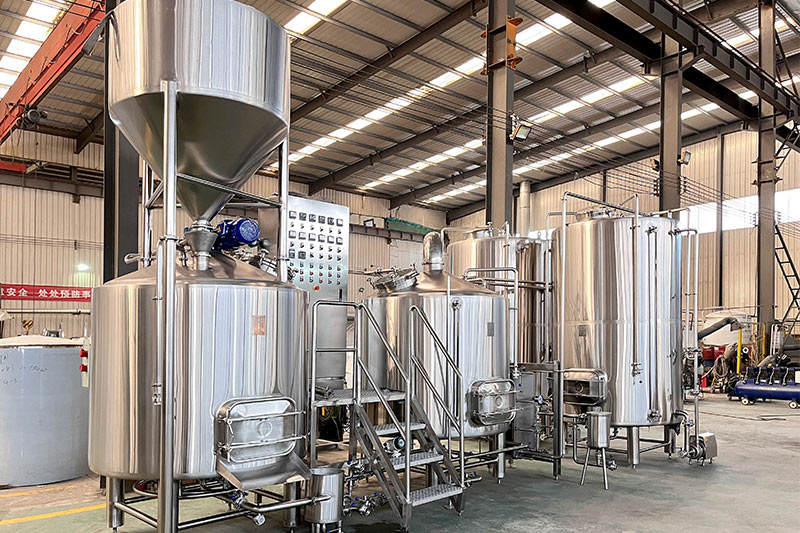Have you ever dreamed of crafting your very own beer at home? Brewing beer is an art and a science, and with the right equipment and supplies, you can transform your kitchen into a personal brewery. This comprehensive guide will walk you through everything you need to know about beer brewing equipment, from selecting the right kit to mastering advanced brewing techniques. Whether you’re a beginner or an experienced home brewer, this article is packed with valuable insights to elevate your brewing experience.

Alt: beer-brewing-equipment
Table of Contents
What Equipment Do You Need to Brew Beer at Home?
Embarking on the journey of home brew is both exciting and rewarding. To brew beer at home, you’ll need some essential beer making equipment. Here’s a list to get you started:
- Brew Kettle: A large kettle where you boil your wort.
- Fermentation Vessel: A container, often a stainless steel or glass carboy, where the beer ferments.
- Airlock and Stopper: To let CO₂ escape during fermentation while keeping contaminants out.
- Thermometer and Hydrometer: For monitoring temperature and alcohol content.
- Bottling Equipment: Beer bottles, caps, and a bottle capper for packaging your beer.
- Siphon and Tubing: For transferring beer between containers.
Having the right equipment not only makes the process smoother but also improves the quality of your beer.
Choosing the Right Beer Brewing Kit for Beginners
As a beginner, selecting a suitable beer brewing kit is crucial. These kits come with all the essential equipment and ingredients you need to brew your first batch of beer. Consider the following factors when choosing a kit:
- Complexity: Start with a starter kit that focuses on extract brewing before moving to all-grain brewing.
- Equipment Quality: Look for kits with stainless steel components for durability.
- Instructions and Support: Kits that include detailed instructions or access to online tutorials are beneficial.
One recommended option is the Microbrewery Equipment from Micet Craft, known for its quality and reliability.
Understanding the Importance of the Brew Kettle
The brew kettle is the heart of your brewing process. It’s where you boil your wort, the liquid extracted from mashing grains during the brewing process. Key features to consider when selecting a kettle:
- Size: A larger kettle reduces the risk of boil-overs.
- Material: Stainless steel kettles are preferred for their durability and heat distribution.
- Built-In Accessories: Some kettles come with built-in thermometers and spigots for convenience.
Investing in a quality brew kettle like the 2 Vessel Brewhouse can enhance your brewing experience.
Stainless Steel vs. Aluminum: Which Kettle Material Is Best?
Choosing between a stainless steel and aluminum brew kettle can impact your brewing. Here’s a quick comparison:
FeatureStainless SteelAluminumDurabilityHighly durableLess durableHeat ConductivityLowerHigherMaintenanceEasy to cleanRequires seasoningCostMore expensiveLess expensive
Stainless steel kettles are generally recommended due to their durability and ease of maintenance, ensuring your beer remains uncontaminated.
The Role of Fermentation in Beer Making
Fermentation is where the magic happens. Yeast consumes the sugars in the wort and produces alcohol and CO₂, transforming it into beer. Key aspects of fermentation:
- Temperature Control: Maintaining the right temperature is crucial for yeast activity.
- Fermentation Vessels: Conical fermenters allow for easy removal of yeast and sediment.
- Airlocks: Prevent contaminants while allowing gases to escape.
Consider investing in quality fermentation tanks like the Beer Fermentation Tank for optimal results.
How to Use a Wort Pump in Your Brewing Process
A wort pump is a valuable tool in the brewing process, aiding in transferring liquids and improving efficiency. Benefits include:
- Circulation: Helps maintain even temperatures during mashing.
- Transfer: Simplifies moving wort between vessels.
- Cooling: Assists with wort chillers to cool wort rapidly.
Ensure you choose a pump that’s food-grade and heat-resistant for safe brewing.

All-Grain Brewing: Taking Your Home Brew to the Next Level
Transitioning to all-grain brewing allows for greater control over your beer’s flavor and style. Essential equipment for all-grain brewing includes:
- Mash Tun: For mashing grains.
- Grain Mill: To crush grains to the desired consistency.
- Sparging Equipment: For rinsing grains.
While more complex, all-grain brewing offers a more authentic brewing experience and a wider selection of beer styles. Consider upgrading to professional-grade systems like the Nano Brewery Equipment for larger batches and more control.
Bottling Your Beer: Essential Supplies and Techniques
Once your beer has finished fermentation, it’s time to bottle it. Here’s what you’ll need:
- Bottles: Typically brown glass beer bottles to protect from light.
- Bottle Caps and Capper: Seal your bottles securely.
- Priming Sugar: Added to create carbonation in the bottle.
Proper bottling ensures your homemade beer stays fresh and carbonated.
The Importance of Proper Kegging Equipment
Alternatively to bottling, kegging your beer offers convenience and quality. Benefits of kegging include:
- Ease of Dispensing: Serve your beer on tap.
- Better Carbonation Control: Adjust CO₂ levels precisely.
- Time-Saving: Eliminates the need to clean and fill multiple bottles.
Invest in quality keg systems like the Keg Filling Machine to streamline your brewing.
Tips for Maintaining Your Beer Making Equipment
Proper maintenance of your beer making equipment is essential for producing quality beer batch after batch. Here are some tips:
- Regular Cleaning: Clean all equipment thoroughly after each use to prevent contamination.
- Sanitization: Sanitize before brewing and bottling.
- Inspect Equipment: Regularly check for wear and replace parts as needed.
- Store Properly: Keep your equipment in a dry, cool place.
By taking care of your beer brewing supplies, you’ll extend their lifespan and ensure consistently great beer.
Frequently Asked Questions
To start making beer at home, you’ll need basic beer making supplies like a brew kettle, fermentation vessel, airlock, siphon, tubing, beer bottles, caps, and sanitizing solution.
While you can use various types of kettles, a stainless steel kettle is recommended due to its durability and non-reactive properties, which are important in the brewing process.
Extract brewing uses malt extract as a base, simplifying the process, whereas all-grain brewing involves mashing grains yourself, offering more control over the final beer.
Sanitation is critical. Any contamination can spoil a batch of beer. Always clean and sanitize your equipment thoroughly.
While not essential, a pump can greatly improve efficiency by aiding in transferring liquids and maintaining temperature during the brewing process.
Manufacturers like Micet Craft offer a wide selection of beer brewing equipment, from starter kits to advanced systems.
Key Takeaways
- Invest in Quality Equipment: Quality beer making equipment enhances your brewing experience and the taste of your beer.
- Understand the Brewing Process: Knowledge of each step, from mashing to fermentation, is crucial.
- Maintain Your Equipment: Regular cleaning and sanitizing prevent contamination and prolong equipment life.
- Continuous Learning: Brewing is both an art and a science—keep experimenting and refining your techniques.
- Safety First: Always practice safe brewing methods to ensure enjoyable and successful results.
Embarking on home brewing is a fulfilling endeavor that combines creativity and precision. With the right equipment and knowledge, you can craft delicious beer and enjoy the brewing process from start to finish.

